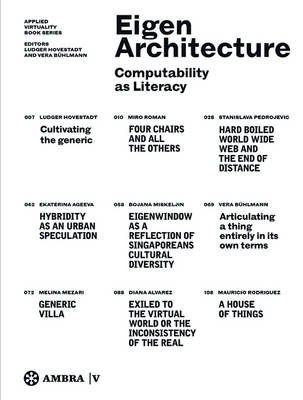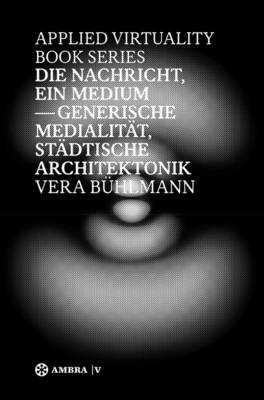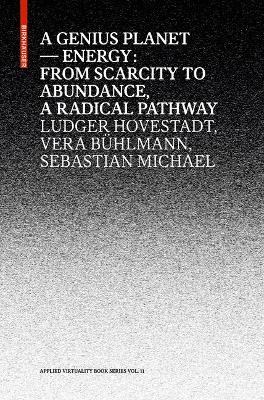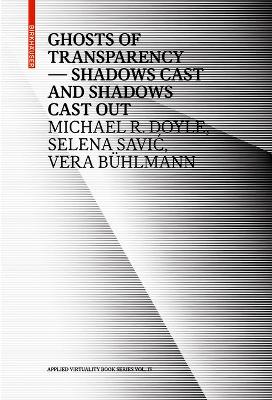Applied Virtuality Book
3 primary works • 5 total works
Book 6
A path out of the technological and economical excesses in contemporary architecture:A book on research and education in architecture and information technology, conceived of as philosophical interplay between two species similar in kind. Neither of them is in the least disciplinal: both affect everything, both are arts of structuring. The one 2500 years old and dignified, the other just 50 years of age and impatient.
Book 7
With her inversion of McLuhan's famous dictum that the medium be the message, the author attempts to sketch a concept of mediality that is capable of hosting and accommodating the self-referential agility of medialized instrumentality within an element of communicability. Mediality is conceived as virtual dis-positivity, and its core predication is to receive and index the totality of what can be a formally-symbolic, and hence a communicable, object. So conceived, mediality foils purely logical, as well as purely fictional notions of order and is capable of opening up the possibility of a civic architectonics, one capable of articulating its assemblages with polyvalent and discretely variable elements, and in a multitude of competing manners. In this book, the author traces the possibility of such an architectonics from a diagnostic and cultural-historical point of view.
Book 11
Imagine a world where the power is always on, where there is not just enough energy, but an abundance of it. Such a world is no Utopia, it is a possible reality. Using indefinitely available sources of energy – especially photovoltaic solar, in combination with others – and networking this energy, much in the way that we have networked information, we can get beyond our current energy ‘crisis’ and resolve it. The world we then find ourselves in is not a world without problems – we will face new challenges on the way – but in terms of energy it is a world of plenty. Rooted in sound theory and based on technology that is available now, A Genius Planet offers an accessible but detailed and insightful perspective on how we can free ourselves from our dependency on natural resources and generate, trade, and use energy in ways that open up the genuine potential that we have at our disposal today.
Ghosts of Transparency
by Michael R. Doyle, Selena Savic, and Vera Buhlmann
Published 23 September 2019
In this book, the editors focus on architecture and communication from various different perspectives – taking into account that the term “architecture” is used for buildings as well as in the context of computer software. Data and software also impact on our cities; raw data, however, do not convey any information – in order to generate information and communication they have to be organized and must make sense to the reader.
The contributions avoid clear separation of the various communication spheres of their disciplines. Instead, they use the wide range of approaches to explore meanings – an ambitious aim that leaves the destination wide open; the reader is invited to share in this adventure.
The contributions avoid clear separation of the various communication spheres of their disciplines. Instead, they use the wide range of approaches to explore meanings – an ambitious aim that leaves the destination wide open; the reader is invited to share in this adventure.
Treatise on digital architecture
Hovestadt’s treatise strictly follows the model of the famous treatises by Vitruvius (De architectura) and Alberti (De re aedificatoria), based on the supposition that we find ourselves in a comparable situation today. Vitruvius and Alberti expressed the meaning of architecture in their eras: Roman antiquity and the Renaissance. Hovestadt has done the same for the present day, incorporating considerations of physics, mathematics, technology, literature, and philosophy.
Books 1 to 3 deal with the role of the architect and the objectivity of architecture.
Books 4 to 6 address the modalities of speaking about and encoding architecture: the secret, the public, and the private.
Books 7 to 10 are dedicated to actual digital mechanisms: artificial intelligence, natural communication, gnomonics, and cultural heritage.
An architectural treatise for our age in 10 books
Inspired by the works of Vitruvius and Alberti
Published in three volumes in the Applied Virtuality series
Hovestadt’s treatise strictly follows the model of the famous treatises by Vitruvius (De architectura) and Alberti (De re aedificatoria), based on the supposition that we find ourselves in a comparable situation today. Vitruvius and Alberti expressed the meaning of architecture in their eras: Roman antiquity and the Renaissance. Hovestadt has done the same for the present day, incorporating considerations of physics, mathematics, technology, literature, and philosophy.
Books 1 to 3 deal with the role of the architect and the objectivity of architecture.
Books 4 to 6 address the modalities of speaking about and encoding architecture: the secret, the public, and the private.
Books 7 to 10 are dedicated to actual digital mechanisms: artificial intelligence, natural communication, gnomonics, and cultural heritage.
An architectural treatise for our age in 10 books
Inspired by the works of Vitruvius and Alberti
Published in three volumes in the Applied Virtuality series




![Cover of [on digital architecture in ten books]](https://images.bookhype.com/covers/e9/b8/95ed598c-539a-4435-8653-ef175f458b9e/9783035625981-fed75328a2b1872372807e.jpg)